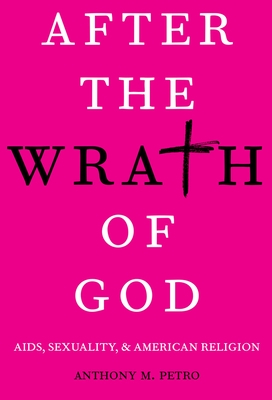After the Wrath of God: Aids, Sexuality, & American Religion

After the Wrath of God: Aids, Sexuality, & American Religion
On a cold February morning in 1987, amidst freezing rain and driving winds, a group of protesters stood outside of the Unitarian Universalist Church in Amherst, Massachusetts. The target of their protest was the minister inside, who was handing out condoms to his congregation while delivering a sermon about AIDS, dramatizing the need for the church to confront the seemingly ever-expanding crisis. The minister's words and actions were met with a standing ovation from the overflowing audience, but he could not linger to enjoy their applause. Having received threats in advance of the service, he dashed out of the sanctuary immediately upon finishing his sermon. Such was the climate for religious AIDS activism in the 1980s. In After the Wrath of God, Anthony Petro vividly narrates the religious history of AIDS in America. Delving into the culture wars over sex, morality, and the future of the American nation, he demonstrates how religious leaders and AIDS activists have shaped debates over sexual morality and public health from the 1980s to the present day. While most attention to religion and AIDS foregrounds the role of the Religious Right, Petro takes a much broader view, encompassing the range of mainline Protestant, evangelical, and Catholic groups--alongside AIDS activist organizations--that shaped public discussions of AIDS prevention and care in the U.S. Petro analyzes how the AIDS crisis prompted American Christians across denominations and political persuasions to speak publicly about sexuality--especially homosexuality--and to foster a moral discourse on sex that spoke not only to personal concerns but to anxieties about the health of the nation. He reveals how the epidemic increased efforts to
advance a moral agenda regarding the health benefits of abstinence and monogamy, a legacy glimpsed as much in the traction gained by abstinence education campaigns as in the more recent cultural purchase of gay marriage. The first book to detail the history of religion and the AIDS epidemic in the U.S., After the Wrath of God is essential reading for anyone concerned with the intersection of religion and public health.
PRP: 343.49 Lei
Acesta este Pretul Recomandat de Producator. Pretul de vanzare al produsului este afisat mai jos.
309.14Lei
309.14Lei
343.49 LeiIndisponibil
Descrierea produsului
On a cold February morning in 1987, amidst freezing rain and driving winds, a group of protesters stood outside of the Unitarian Universalist Church in Amherst, Massachusetts. The target of their protest was the minister inside, who was handing out condoms to his congregation while delivering a sermon about AIDS, dramatizing the need for the church to confront the seemingly ever-expanding crisis. The minister's words and actions were met with a standing ovation from the overflowing audience, but he could not linger to enjoy their applause. Having received threats in advance of the service, he dashed out of the sanctuary immediately upon finishing his sermon. Such was the climate for religious AIDS activism in the 1980s. In After the Wrath of God, Anthony Petro vividly narrates the religious history of AIDS in America. Delving into the culture wars over sex, morality, and the future of the American nation, he demonstrates how religious leaders and AIDS activists have shaped debates over sexual morality and public health from the 1980s to the present day. While most attention to religion and AIDS foregrounds the role of the Religious Right, Petro takes a much broader view, encompassing the range of mainline Protestant, evangelical, and Catholic groups--alongside AIDS activist organizations--that shaped public discussions of AIDS prevention and care in the U.S. Petro analyzes how the AIDS crisis prompted American Christians across denominations and political persuasions to speak publicly about sexuality--especially homosexuality--and to foster a moral discourse on sex that spoke not only to personal concerns but to anxieties about the health of the nation. He reveals how the epidemic increased efforts to
advance a moral agenda regarding the health benefits of abstinence and monogamy, a legacy glimpsed as much in the traction gained by abstinence education campaigns as in the more recent cultural purchase of gay marriage. The first book to detail the history of religion and the AIDS epidemic in the U.S., After the Wrath of God is essential reading for anyone concerned with the intersection of religion and public health.
Detaliile produsului








